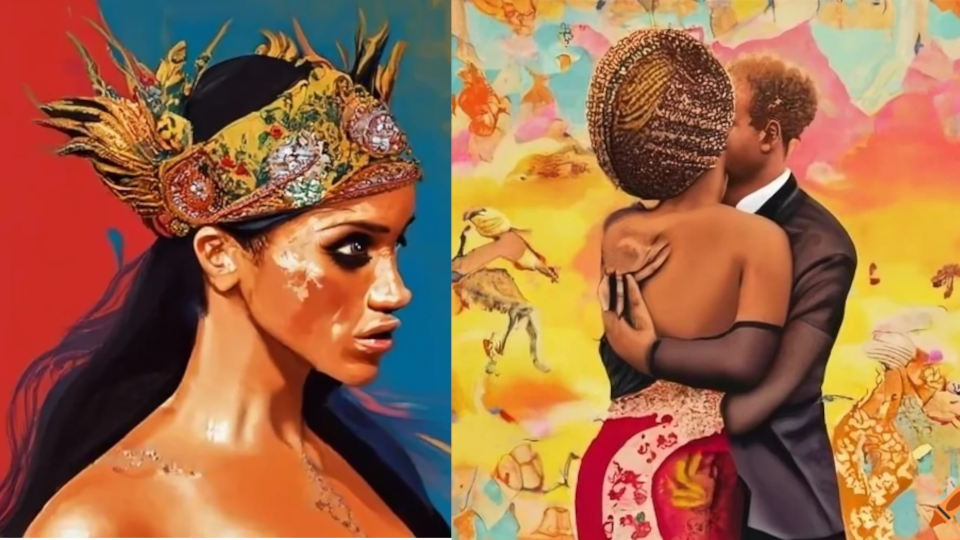
AI generated artwork by Nicotina
At the beginning of 2020, no one could have predicted the sharp shifts in all our lives to follow, even though there was glaring evidence that this was going to be no ordinary year. Ferocious bushfires had swept across Australia where I happened to be, making going outdoors feel like entering a city-wide barbecue. The United States House of Representatives had passed a vote to the Senate to begin an impeachment process against then-president, Donald Trump.
And there was a scandal.
Social media had gone into overdrive as Meghan Markle and Prince Harry, the Duchess and Duke of Sussex in the UK, announced that they would be stepping down from their official roles within the royal family. Commentators and pundits made their guesses at what might happen next. Closeted racists came out to play, naturally attacking Meghan based on her biracial background.
But then there was Wendy Gumede (also known as The Black Wendy), the South African content creator popular for overlaying official conversations with casual and unlikely Xhosa versions, who simply outdid herself with her satirical take on events.
Late in 2019, Harry and Meghan had met with another illustrious couple, Jay-Z and Beyoncé, at the London premiere of the movie, The Lion King. It was the short exchange between them – featuring hugs, handshakes and some pleasantries – that Gumede then turned into comedic gold as news of the royals’ exit emerged. In one video, Gumede imagines Meghan confiding in Beyoncé about how she is tired of the bland royal food (meat toasted in coconut oil with salt as its only condiment) she has to eat, and that she will have to get back to Beyoncé later for the hot sauce she is always talking about – a reference to the now-famous ‘I got hot sauce in my bag swag’ lyrics in Beyoncé’s 2016 hit, ‘Formation’.
But in the more viral of her two videos, with over 8,000 Twitter retweets and almost 20,000 likes, depicting the same conversation, Gumede has Meghan talking through her frustrations about the royal family as Beyoncé provides an exasperated but empathetic ear. Meghan thanks Beyoncé for the offer of the one room in the back of the couple’s home and exclaims about how ready she is to leave the royal fold. She calls Harry into the exchange, and he cuts off a conversation with someone off camera who he is trying to negotiate with to buy some of his suits so he can make rent money. He is in a deferential mood and refers to the couple as his landlords before calling Jay-Z as ‘bhoza yami’, a Xhosa colloquial term for ‘my boss’.
Beyond the obvious humorous nature of the skit, it is how Gumede ascribes these mega stars to the characters of ordinary Xhosa-speaking folks talking through the dramas of normal life that makes the skit land perfectly. In this way, Gumede is able to highlight the absolute absurdity of fame. In making these celebrities speak far less formally than we might ever hear them do, she reminds us that they too are ordinary human beings not above the perils of complicated family dynamics and financial insecurity. And because so many can relate to this, they too become somewhat more relatable.
Beyond the obvious humorous nature of the skit, it is how Gumede ascribes these mega stars to the characters of ordinary Xhosa-speaking folks talking through the dramas of normal life that makes the skit land perfectly.
Sometimes, Gumede will also give her stock characters local names. An example is her remake of the infamous video when then-Prince Charles prompts an aide to take away a pen from a desk with a condescending grimace and shoo. In her reimagination of the event, Gumede gives the aide a colloquial name, Senzo, and of course has the monarch speaking in vernacular language.
A few other African digital content creators have taken to reimagining popular events from unlikely local perspectives. I speak more about this in a recent vlog where I talk about Gumede’s work while highlighting two other interesting examples. In one, a TikToker posts a video of the coronation of King Charles with a clickbait caption that reads, “I still can’t believe this happened at the coronation… .” Expecting something more dramatic – perhaps, the crown falling off the monarch’s head to hushed sounds of disbelief – the viewer is instead caught completely unaware. As the Archbishop of Canterbury secures the crown over King Charles’s head, he declares, “God save the king!”, and then ‘Calm Down’, a popular Afrobeats song begins to blare throughout the hallowed walls of Westminster Abbey. Just as Gumede does, the user overlays the words of the song to the movements and gestures of the congregation so that it looks like the new Queen Camilla, Prince William and Princess Kate are all singing along to the song, and not to the hymn they are actually following. In the other video I talk through in the vlog, a TikTok user makes use of AI to have Drake and Rihanna sing a popular Nigerian gospel song.
All these are examples of African digital cosmopolitanism, a concept that I have been building for some years and which I have done research and written about. The earliest ideas of cosmopolitanism, or the idea of the global citizen, as imagined by key thinkers, such as the 18th century philosopher Immanuel Kant, hardly included non-Western subjects. In fact, many of these thinkers were known for their racial and geopolitical biases. In recent years, scholars have sought to reframe cosmopolitanism. They are doing this by pluralising cosmopolitanism to cosmopolitanisms to reflect the concept’s dynamic potential. They are also doing so by integrating new and more inclusive forms of it such as vernacular cosmopolitanism, indigenous cosmopolitanism and feminist cosmopolitanism. Digital cosmopolitanism is another new conceptualisation of cosmopolitanism which can be summarised as the potential of the internet and digital tools to create new counterpublics and networks of solidarity which foment intercultural exchanges.
I add on to this by defining an African digital cosmopolitanism which I conceptualise as challenging the idea that Africans are passive recipients of knowledge and exchange flows, but are also creating a global digital citizenry in which their culture too is global. In African digital cosmopolitanism, cultural flows are not fixed from the West to the rest of the world; Africans are also creating loci of power that flow the other way. Many examples of this abound. I have written previously about Elsa Majimbo who managed to globalise her Kenyan COVID skits, and of social media trends like #JerusalemaChallenge and #DontLeaveMeChallenge which started on the African continent and enjoyed global virality.
The earliest ideas of cosmopolitanism, or the idea of the global citizen, as imagined by key thinkers, such as the 18th century philosopher Immanuel Kant, hardly included non-Western subjects. In fact, many of these thinkers were known for their racial and geopolitical biases.
But self-insertion into Western narratives is equally a feature I see of African digital cosmopolitanism. When Africans place their languages and colloquialisms into Western events and moments, or even make Western artists engage in their cultures, it is as if to say, “You may ignore us, but we will repurpose your cultures to suit our own contextual imaginaries.” When it comes to reimagining British royal events, this is particularly symbolic, given what the monarchy means to many African countries that experienced British colonialism. And while there is still a long way to go in defining ethical uses of AI, it is also political to see Africans – from a continent almost always omitted from the line-up of Western artists’ ‘world’ tours and concerts – creating content where these performers sing their own local songs.
Purists argue that such reimagining and insertions are working to make historical fact redundant. We see this in the ways that shows that reimagine history, like Bridgerton, get negative feedback for ‘tainting’ ‘facts’ by incorporating people of colour into their storylines. I am personally not a fan of the show, but hardly see how it obliterates the dominant narrative of the Regency period. There are archives and canons of historical work that are greatly preserved within galleries, libraries and museums; statues and memorials to events and figures of past times. I don’t see such self-insertion affecting those canons in any major way.
Rather, I see it as a sign of a shift. Technologies and digitality are allowing more and more people who might never have access to spaces to speak back, write back and create back to do so, and to share these reimagined realities with other like minds. This re-centres ideological power and makes us look again at the absurdity of relations based upon one way flows of exchange which continuously orient non-Westerners as others and Westerners as sole custodians of knowledge.
And it is that sort of pushback that I imagine African digital cosmopolitanism to be.
- 127 views







Add new comment